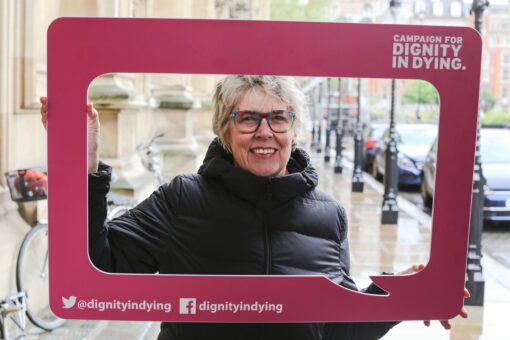Support for assisted dying unites public like no other issue, says Dame Prue Leith, amid calls to party leaders for national debate

Prue is inviting members of the public to add their names to her open letter to Rishi Sunak, Sir Keir Starmer and Sir Ed Davey, calling on party leaders to bring forward a national debate on assisted dying as a matter of urgency in the next Parliament.
Prue’s letter describes how “Some people’s suffering is beyond the reach of even the best palliative care” and highlights data from the Office of Health Economics estimating that, even with universal access to hospice care, 17 people a day will suffer as they die.
It also points to the growing number of countries and parts of the British Isles that are moving to introduce safe and legal options for assisted dying – including Scotland, Ireland, France, Jersey and the Isle of Man.
Prue is a long-standing campaigner on assisted dying, most recently exploring the issue in the Channel 4 documentary Prue and Danny’s Death Road Trip, which aired this February. She has spoken about how she was motivated to join the campaign after witnessing her brother David die an agonising death from bone cancer in 2012.
Dame Prue Leith CBE, Patron of Dignity in Dying, said:
“When our documentary aired, hundreds of people from all walks of life wrote to me to share personal and often quite harrowing stories about how the current law has impacted them and their families. In these divided times, it’s rare for an issue to unite so many across age groups, backgrounds and political views.
“It’s important that MPs grasp this and understand that assisted dying is neither a party-political issue, nor a controversial one for the vast majority of their constituents. Across the UK, people have seen first-hand the many ways that the current law fails our dying citizens, just as I saw how it failed my late brother. Only Westminster can put this right.”
The British public overwhelmingly supports law change on assisted dying, with national polling over the last 40 years consistently showing that up to 80% of people are in favour of changing the law to allow terminally ill, mentally competent adults in their final months of life the choice to die on their own terms.
Prue’s open letter can be read in full at www.dignityindying.org.uk/prue, and members of the public who believe the law should change are invited to add their names via the webpage. Prue will also invite MPs and Peers to sign the letter at a special event at the Houses of Parliament on Tuesday 23rd May.
Sarah Wootton, Chief Executive of Dignity in Dying said:
“The current law is not regulated, it’s not safe and it’s not fair. The public know this and urgently want change, yet successive governments have failed to prioritise the issue, nor allowed a free and fair debate.
“Assisted dying is a movement whose time has come. Nowhere is the personal more political than in matters of life and death. The next election needs to count for dying Britons and party leaders should prioritise a debate on assisted dying.”
Assisted dying is banned across the British Isles. It is currently a crime in England and Wales under the Suicide Act 1961, which states that a person found guilty of “assisting or encouraging a suicide” can face a sentence of up to 14 years.
Without an assisted dying law, terminally ill people facing a painful or protracted death are left with stark choices:
- Suicide: Every year, hundreds of terminally ill people end their own lives in the UK. People with severe and terminal health conditions may be more than twice as likely to take their own lives than those without.
- Switzerland: Every week, one British citizen travels to Switzerland for help to die (pre-pandemic average). As well as costing over £10,000, dying people cut their lives short so they can travel while they are still well enough, and put their loved ones at risk of prosecution.
- Suffering: Every day, 17 people experience unrelieved pain as they die, even with universal access to specialist care. Alongside excellent end-of-life care, dying people should have the choice of an assisted death.
*ENDS*
For further information or interviews with people with personal stories, representatives of Dignity in Dying or parliamentarians, please contact Molly Pike, Media & Campaigns Officer, at 07929 731181 or molly.pike@dignityindying.org.uk.